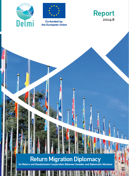Under international law, every country has an obligation to accept its own citizens if they are denied entry or expelled from another country. Thus, taking back citizens should be well-established practice among states. However, this is not always the case. In recent decades, several methods and tools have been designed to define and determine the conditions and forms for returning people to their countries of origin.
Among these tools, multi- and bilateral, so-called readmission agreements are the most prominent and most frequently cited in research and international relations. However, these agreements have been criticized for having a relatively limited effect on the number of people who actually return. The critics point to shortcomings in implementation, lack of respect for human rights and that these agreements are the result of temporary political currents rather than long-term solutions.
Readmission agreements, as part of the return process, require extensive international cooperation. At an operational level, diplomatic representations are an important actor. The readmission process can include everything from obtaining correct ID documents that enable the departure itself to offering support structures in the country of origin to facilitate reintegration.
The first part of the AMIF-funded project touched upon the theme of the role, function, and cooperation within and between Swedish and foreign authorities in the return and readmission process. With the aim of addressing how diplomatic tools as well as national and bilateral cooperation (formal as well as informal) can promote a more effective, sustainable and humane return of persons who do not have a legal right to stay in Sweden.
The report presents the following conclusions and recommendations:
- A systematic evaluation of migration diplomacy tools should consider what works and in which cases. Those tools that promote coordination should be considered as permanent functions within the return chain.
- Establish a programme for ongoing communication with diplomatic missions. There is a need for continuous information about Swedish migration rules and their changes - which have been many in recent years. A clear picture of the number of return decisions per country is also essential.
- It is essential to equip the Embassy Coordination Units and other relevant SMA officers with the necessary resources, including diplomacy training, appropriate tools, direct access to new representatives, and a comprehensive intercultural communication strategy that extends beyond return decisions.
- We propose redefining the concept of efficiency in return policy to prioritize not only the quantity but also the quality of returns, ensuring that they are conducted in a humane and sustainable manner. Additionally, we advocate for a more nuanced approach that considers the long-term outcomes and ethical implications of return decisions, rather than focusing solely on the removal of individuals.
- Bilateral agreements, whatever form they take, should be followed up and properly evaluated.
- Whenever an attentive presence is established in diplomatic missions, it is crucial to seize the opportunity to foster deeper relationships with countries of origin. Many diplomatic missions are interested in closer ties with Sweden, but are often engaged solely for return and readmission matters.
- When designing policies toward countries of origin, it is important to differentiate between general incentives and ad hoc incentives.
- Develop a comprehensive long-term strategy for managing return migration, ensuring that incentives and tools are tailored to the specific needs and conditions of each country of origin.

The project is funded by the Asylum, Migration and Integration Fund (AMIF).
Photo: J Lee, Unsplash





